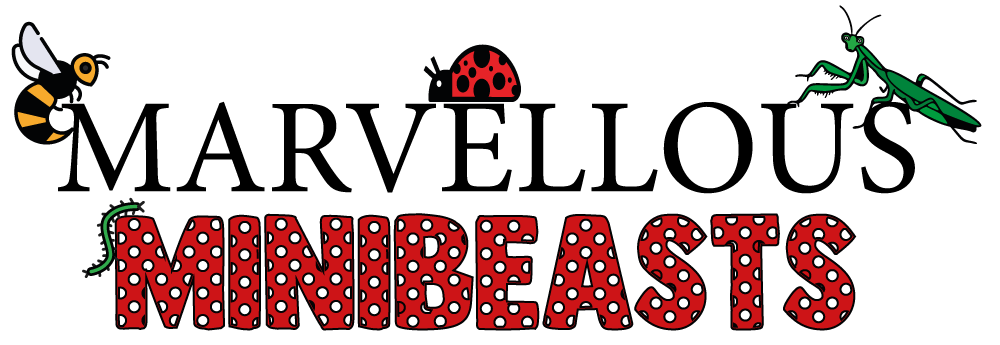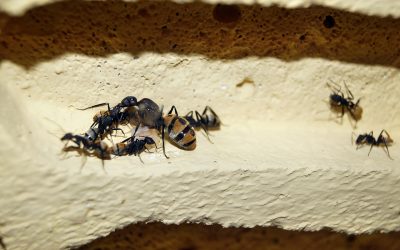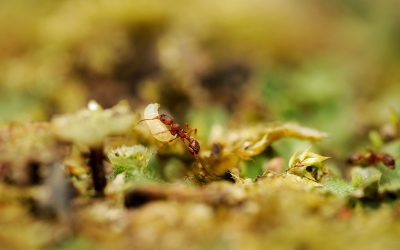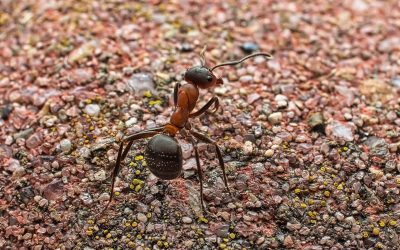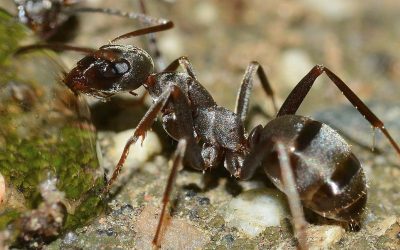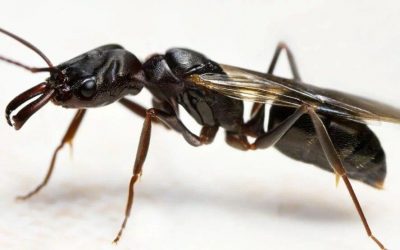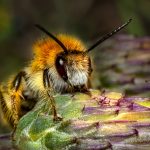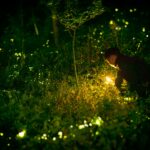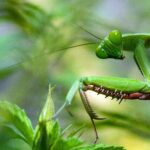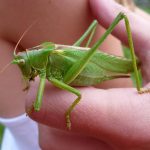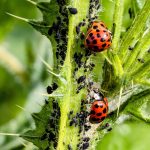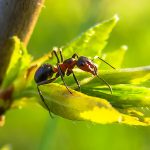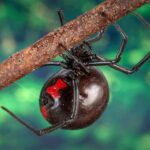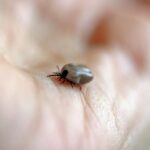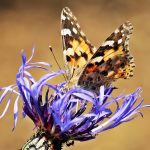Ants are a highly social and organized group of insects that are found in almost every part of the world. They belong to the family Formicidae, and there are over 12,000 known species of ants. Ants are known for their distinctive appearance, with a narrow waist and elbowed antennae. They are also known for their incredible strength, with some species being able to carry objects up to 50 times their own body weight. Ants are omnivorous, and their diet includes both plants and animals. They communicate with each other using chemical signals known as pheromones, and work together to build complex nests and defend their territory. Ants play an important role in many ecosystems, helping to aerate soil, control pests, and disperse seeds. However, some species of ants can be considered pests, invading homes and causing damage to structures and crops. Overall, ants are fascinating insects with a complex and highly organized social structure, making them a subject of great interest to scientists and nature enthusiasts alike.
What is an ant?

Ants are eusocial insects that belong to the Formicidae family; ants are also closely related to bees and wasps. The word eusocial is given to a group of animals or in this case, insects who live in colonies. A colony usually consists of one queen ant; however, a colony can be started with two queens, but once established, they will fight to the death to gain control.
The queens are taken care of by workers who express complex behaviours like; division of labour, foraging for food and defending the colony against predators. It is quite interesting to watch this happening in real time which is why people like to keep them as pets.
females ants
There are two types of females within a colony, the queen and her daughters. Queen ants are different from the other females in the colony because they are born with a purpose; they carry a combination of genetics from both parents to be able to reproduce.
Unlike female worker ants, Queens are born with wings, and the reason for this is because they mate in midair. They will mate with several males, gathering up sperm to fertilise the millions of eggs she will produce during her life. Once a queen has mated, she will drop to the ground, shed her wings, and build her colony. Unfortunately for the male ants that mate with the queen, they will die soon after.

Male ants

Male ants are called drones. They don’t really do anything within a colony; they are there solely to mate with queens in other colonies. Queens can produce male and female ants; Fertilised eggs produce female ants, and unfertilised eggs produce male ants.
Male ants will leave the colony once a year to mate, and they will die soon after. The queen can choose to produce males or females depending on the number inside the colony. If the queen produces too many males, the workers will kill some of the male eggs.
Starting an ant farm
An ant farm is called a formicarium. You can start your ant formicarium using a basic starter kit; once your colony is established, you can expand it or even switch it out for a bigger one. The most popular is the sandwich-type housing, but they can be built in a vivarium style too.
The good thing about purchasing an ant farm starter kit is you won’t need to worry about sourcing all the individual components as they will all be included with the kit, the downside to the kit is that they tend to be really small, so if you want a bigger one, you will need to fabricate one yourself or switch to a vivarium style set up. Don’t try to go too big, too fast, as ants really don’t like to be in this type of environment, start small.
The central part of your colony is the nest; this is where the ants will spend most of their time, digging tunnels etc. the second part is called an outworld, which is where your ants will go to forage for food and dump things they don’t want, in a sort of trash pile.

Substrate
Sand is probably the most popular substrate to use in ant farms; ants can easily dig tunnels allowing you to view their activity. The sand needs to be damp, or they may struggle to dig. You can poke holes into the sand with a toothpick or a skewer to start them off. You will need to make sure the sand stays damp to avoid any tunnel collapses. It is a good idea to wash the sand before using it to remove any dust which can be harmful to the ants.
Sand
Sand is probably the most popular substrate to use in ant farms; ants can easily dig tunnels allowing you to view their activity. The sand needs to be damp, or they may struggle to dig. You can poke holes into the sand with a toothpick or a skewer to start them off. You will need to make sure the sand stays damp to avoid any tunnel collapses. It is a good idea to wash the sand before using it to remove any dust which can be harmful to the ants.
Soil
Soil is the most natural form of substrate to use in your ant farm; the ants can obtain extra nutrients from it, but you can add plants that are great for the soil and pleasing on the eye, that’s if you want to create a visually attractive ant farm.
Gel
This type of substrate is not recommended to use in ant farms, it’s not a natural substance, and it is difficult to keep clean. It also gets mouldy very quickly. The chances of your ants surviving for more than a few weeks in it is very low. You also won’t be able to keep a queen in this gel, so expanding your colony is out of the question. If your kit comes with gel, then switch it out for either sand or soil or a mixture of both.

Heat and humidity

When choosing ants to build your first colony, it is recommended that you start with ants that are native to where you live. Choosing native ants means you won’t have to worry about providing a heat source as they will already be climatised. If you select ants that come from warmer climates, you will need a heat source. It’s hard to say what humidity you will need until you know what type of ant you will purchase. You will need to research that particular species, as some ants prefer dryer conditions and others prefer more humid conditions.
As mentioned, if your ants are native, you won’t require a heat source because they will already be used to the temperatures where you live. However, you might want to use a heat mat when starting out your colony. Heat can speed up the breeding process, but you will need to put the heat mat on a thermostat to regulate the temperatures inside your ant farm. If it gets too hot, you will kill the ants, so you must be careful.
If you are using a heat mat, you should either position it on the backside of your ant farm or under one section rather than underneath the entire farm. Ideally, the farm should be raised, so it’s not sitting directly on the heat mat. Your ants will move to another part of the nest if it gets too warm for them.
Light bulbs

When you are not viewing your ants, the nesting area should be covered so that no light shines in; ants prefer to nest in complete darkness. You can remove the cover each time you want to see what your ants are up to. Just remember to replace it when you are finished. You can use a sheet of red acetate, and this will keep the nest dark but still allow you to see what’s going on inside.
Feeding your ants
Ants are omnivores which means they can eat animals and plants. Ants are not particularly fussy with what they eat, but they do require different amounts of each.
Queens need more protein than worker ants because they are continually reproducing. Worker ants need more carbohydrate foods which is why they love sugary things.
Sugar can be fed in different forms, but the most efficient is by giving them liquids like syrup, honey or even sugar water. You can also provide your ants with varying types of fruit to see which they prefer to eat.
Your ants also require water. Use a bottle cap or a piece of foil; you can place a piece of cotton wool inside if you are worried about your ants drowning.

Ant facts
Ants kidnap ants from other colonies to make them work in their own.
An ant can lift 20 times more than its own body weight.
Queen ants shed their wings when they mate, then they dig and start a colony.
Male ants leave the nest once a year to mate, they die once they mate with a queen.

Important information
You do not need to use a lid on your ant farm if you are worried about ventilation. You can use insect repellent to stop your ants from escaping; we recommend using Polytetrafluoroethylene (PTFE).
Whichever you decide to use the barrier should be applied along the top on the inside of the glass, it stops the ants from going near or crossing over the barrier. These types of barriers need to be reapplied every so often to prevent any escapees. If you want to have a lid of some sort, you can use an old stocking or some fine mesh fabric.
You might also Like
Can You Add Workers From A Different Colony
Ants are relatively small insects. However, what they lack in size, they more than make up for in numbers.
What Are Those Small White Things That Ants Carry Around?
The small white things ants carry around are actually brood laid by queen ants. they include eggs, larvae, or pupae.
How To Start An Ant Farm
You have done some research, and you have decided that you want to start an ant farm. Well, you have come to the right place.
What Do Ants Do With Their Injured?
Ants, wasps and bees are eusocial insects that are classified as members of the order Hymenoptera. ants belong to the family Formicidae.
Do Flying Ants Bite?
Flying ants are really interesting once you learn what they do, but with swarms of flying ants flying around once a year, you might be slightly concerned about whether or not they are able to bite.
